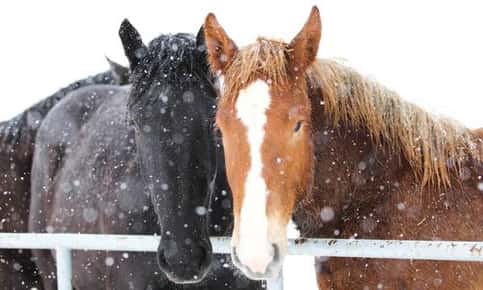
Caring for Your Horse in the Winter
Horses may tolerate cold weather better than people do, but they still need a little extra care when the temperatures begin to drop. These five tips will help you keep your horse warm and healthy during the winter months.
Provide Plenty of High-Quality Feed
Eating extra forage helps your horse stay warm on chilly days. In fact, horses generate body heat as they digest the fiber in hay or alfalfa. Be sure to keep hay or alfalfa dry and mold-free during the winter months to ensure that your horse receives key nutrients.
Remove Ice Promptly
Even the most sure-footed horses can slip on an icy patch of ground and experience devastating injuries. Fortunately, decreasing the risk of a joint injury or a broken leg can be accomplished fairly easily. Start by filling in low lying areas of the paddock or path where puddles and ice tend to form.
As soon as snow falls, remove it immediately by shoveling or plowing. If you get rid of snow promptly, it will be less likely to become icy. Use rock salt sparingly, and only if ice remains after shoveling, as salt may dry out your horse's hooves. Adding a little sand to slippery surfaces can help increase traction.
It's also important to remove snow and ice from your horse's hooves every day. Impacted snow or ice not only increases the risk of slipping but can affect the gait and increase the risk of tendon or joint injuries. If your horse wears shoes, consider adding snow pads that prevent snow from collecting under the shoes.
Although your horse's hooves grow more slowly during the winter, you'll still need to arrange for trimming every few months.
Offer Warm Water
Your horse also needs to increase its water intake during the winter. Eating more forage than usual without increasing water consumption can increase the risk of a painful and potentially deadly case of colic.
Unfortunately, water may not be quite as appealing if it's too cold. During a 1994 research study, the University of Pennsylvania researchers discovered that ponies drank more if their water was warmed. One group of ponies was given 66 degrees F water, while the other group drank water between 32 and 38 degrees F.
The ponies given the warmer water drank 40 percent more than those that drank cold water. Adding bucket heaters to your stable will keep drinking water warm, prevent ice from forming and ensure that your horse gets enough to drink.
Keep Stables and Sheds in Good Repair
Before the worst of the winter weather arrives, inspect stables, sheds, and shelters for missing boards or shingles or other signs of damage. Although your horse will probably be comfortable outdoors on a dry winter day, access to shelter is important if it's windy or snows, rains or sleets.
Choose the Ideal Blanket for the Circumstances
Blankets add much-needed warmth during bitterly cold spells when used properly. Stable blankets should only be used if your horse will be spending time indoors. Swap the stable blanket for a waterproof one if your equine friend will be exposed to the elements. Change the blanket if it becomes wet with sweat, rain or snow, as moisture seals in the cold. Check the fit of the blanket often and replace it if it causes sores or doesn't fit properly.
A few seasonal changes, in addition to regular veterinary care, will help keep your horse healthy and comfortable during the winter months. Do you have a few questions about winter care? Give us a call, and let us know how we can help you.
Sources:
University of Minnesota Extension: Caring for Your Horse in the Winter
